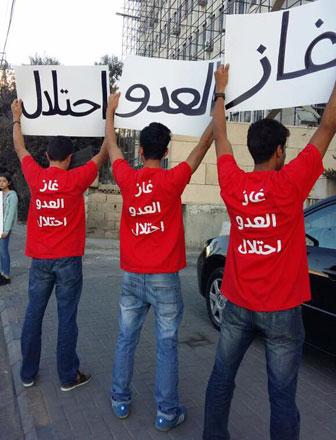You are here
University students protest gas deal with Israel
By Suzanna Goussous - Sep 29,2016 - Last updated at Sep 29,2016

Students protest against Jordan's gas deal with Israel on campus at the University of Jordan on Thursday (Photo by Suzanna Goussous)
AMMAN — University students participated in a march on Thursday to demonstrate against the gas deal signed on Monday between the Kingdom’s National Electric Power Company (NEPCO) and Israel.
Held at the University of Jordan campus, the protest sought to “show the outrage among students and the younger generation of the country”, Student Union member Mohammad Dmour said.
“As Jordanians, citizens of a neighbouring country to Palestine… As Arabs and free individuals, we believe in freedom. We organised this demonstration to protest the gas deal with Israel that shocked the people of Jordan,” Dmour told The Jordan Times.
He described the act as part of a “pro-normalisation” movement. “Jordan will face negative consequences; we will pay for every bullet and the blood of our people in Palestine.”
Dmour said the deal is “rejected on all levels from the people”.
“As university students, we will step up our activities; it is not something we can be silent about,” the activist added.
NEPCO said on Wednesday that the deal with US Noble Energy to import natural gas is one of the Kingdom’s several options to import gas in the future.
Noble Energy is a Houston-based company that holds the largest share in the Israeli Leviathan gas field, located in the Mediterranean Sea off the coast of Israel.
The state-owned NEPCO said the deal will help save Jordan around $600 million per year.
Jilan Abu Rub, a political science student, questioned the timing of signing the gas deal, especially that it was signed when Jordanians were busy with elections and other events in the Kingdom.
“Saeed Amro was murdered in the occupied territories, journalist Nahed Hattar was assassinated and elections were taking place when they decided to announce signing the deal,” she said.
Abu Rub charged: “We are talking about the stolen resources of a country. We are buying stolen gas; this means we will be funding their army and settlements.”
She said Jordan has several natural resources that can be used to generate electricity without having to sign the 15-year gas deal with “the Zionist entity”.
“Alternatives are always available. But signing the deal with the enemy was a distant possibility for us as Jordanians, it’s a shame to support terrorism,” the student added.
Jordan signed a peace deal with Israel in 1994.
Malek Abu Isbaa, from “Ahl Al Himmeh” bloc, echoed her sentiment.
“A high percentage of our electricity bills will fund the Zionists. It is Palestine’s gas and we are supporting our enemy… Jordanian blood cannot be sold for a gas deal,” Abu Isbaa charged.
Student Anas Hussein, from the Arab Renewal bloc, said students will participate in several activities to show their disapproval.
“We will keep resisting normalisation no matter what it takes,” he added.
“There are other alternatives such as the Algerian gas,” he said.
A NEPCO official said the deal with Noble Energy will enable Jordan to import 300 million cubic feet of gas per day, which represents 40 per cent of the Kingdom’s electricity-generating needs.
Jordan will still import liquefied natural gas from international markets at the same time, the official said, adding that the Kingdom is in talks with Algeria to import natural gas as part of its strategy, and in the future, it plans to import from Egypt to cover the remaining needs.
Al Awda bloc’s Ghassan Isteitieh said Jordanian citizens “refuse to fund the occupation and support the Zionist army”.
“We have to raise awareness among people on the dangers of signing this gas deal,” Isteitieh added.
Students said the so-called Jordanian National Campaign Against the Gas Agreement with the Zionist Entity will organise a sit-in on Friday after the noon prayer in front of Al Husseini Mosque in downtown Amman to demand reversing the decision.
Related Articles
AMMAN — The government-owned National Electric Power Company (NEPCO) on Monday signed an agreement with Noble Energy under which the latter
Members of the Jordanian National Campaign to Thwart the Gas Deal with the Zionist Entity on Wednesday announced that they will organise a demonstration on Friday to pressure the government not to sign the agreement.
AMMAN — Activists on Tuesday called on Jordanians to turn off their lights for one hour on Sunday to protest the recent gas deal between Jor

















